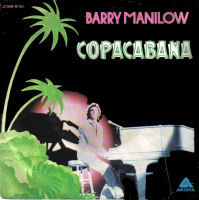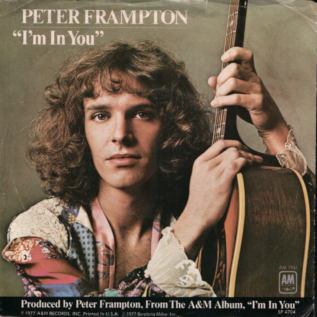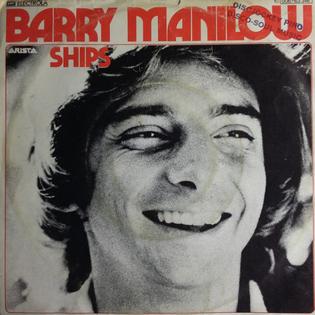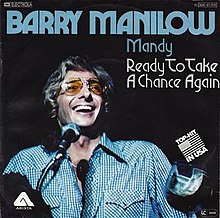
"Copacabana", also known as "Copacabana (At the Copa)", is a song recorded by Barry Manilow. Written by Manilow, Jack Feldman, and Bruce Sussman, it was released in 1978 as the third and final single from Manilow's fifth studio album, Even Now (1978).

"You're All I Need to Get By" is a song recorded by the American R&B/soul duo Marvin Gaye and Tammi Terrell and released on Motown Records' Tamla label in 1968. It was the basis for the 1995 single "I'll Be There for You/You're All I Need to Get By" from Method Man and Mary J. Blige.

"I Write the Songs" is a popular song written by Bruce Johnston in 1975 and released on his album Going Public in 1977. Barry Manilow's version reached number one on the Billboard Hot 100 chart in January 1976 after spending two weeks atop the Billboard adult contemporary chart in December 1975. It won a Grammy Award for Song of the Year and was nominated for Record of the Year in 1977. Billboard ranked it as the No. 13 song of 1976.

"Brandy", later called "Mandy", is a song written by Scott English and Richard Kerr. It was originally recorded by English in 1971 and reached the top 20 of the UK Singles Chart.

"Could It Be Magic" is a song written by Adrienne Anderson and composed by Barry Manilow, inspired by Frédéric Chopin's Prelude in C minor, Opus 28, Number 20.

"Weekend in New England" is a song recorded by Barry Manilow for his fourth studio album, This One's for You (1976). Written by Randy Edelman, it was released as the second single from the album, and became a Top Ten hit on the Billboard Hot 100, while topping the Adult Contemporary chart.

"Then Came You" is a 1974 song recorded by American soul singer Dionne Warwick and American R&B group The Spinners. It was credited to Dionne Warwicke and the Spinners. The track was written by Sherman Marshall and Phillip T. Pugh, and produced by Thom Bell.

"Shadow Dancing" is a disco song performed by English singer-songwriter Andy Gibb. The song was released in April 1978 as the lead single from his second studio album of the same name. The song reached number one for seven weeks on the Billboard Hot 100 in 1978. Albhy Galuten arranged the song with Barry Gibb. While Andy Gibb would have three more Top 10 hits in the U.S., this would be his final chart-topping hit in the United States. The song became a platinum record.

"More Love" is a 1967 hit single recorded by the American soul group The Miracles for Motown Records' Tamla label. The single, included on the group's 1967 album Make It Happen, later reissued in 1970 as The Tears of a Clown. Kim Carnes's 1980 cover of the song reached the Top 10 of Billboard's Adult Contemporary and Hot 100 charts.

"Somewhere Down the Road" is a popular song written by Cynthia Weil and Tom Snow and most famously recorded in 1981 by Barry Manilow. Weil wrote the song's lyrics and Snow wrote the melody.

"I Just Want to Be Your Everything" is a song recorded by Andy Gibb, initially released in April 1977 as the first single from his debut album Flowing Rivers. It reached number 1 on the Billboard Hot 100 for three weeks, starting on the week ending 30 July 1977, and again for the week ending 17 September 1977. It was Gibb's first single released in the United Kingdom and United States. His previous single, "Words and Music" was only released in Australia. It is ranked number 26 on Billboard's 55th anniversary All Time Top 100 list.

"I'm in You" is the hit song released by Peter Frampton as a single from his album I'm in You, released in 1977. It rose to No. 2 on the US Billboard Hot 100 and No. 1 on the Cash Box Top 100 and in Canada, becoming his most successful single. The song was kept from reaching the top spot on Billboard by Andy Gibb's "I Just Want to Be Your Everything".

"Never My Love" is a pop standard written by American siblings Don and Dick Addrisi, and best known from a hit 1967 recording by the Association. The Addrisi Brothers had two Top 40 hits as recording artists, but their biggest success as songwriters was "Never My Love". Recorded by dozens of notable artists in the decades since, in 1999 the music publishing rights organization Broadcast Music, Inc. (BMI) announced it was the second most-played song on radio and television of the 20th century in the U.S.

"I Go Crazy" is a song written, composed, and recorded by American singer-songwriter Paul Davis. It was the first single released from his 1977 album Singer of Songs: Teller of Tales, and his second-highest peaking pop hit, peaking at #7 on the Billboard chart in 1978. The song entered the Billboard US Hot 100 pop singles chart on 27 August 1977 and began slowly climbing, peaking in March and April 1978, before dropping off the chart the week after 27 May 1978. Overall, it spent 40 weeks on the Billboard Hot 100 chart, setting what was then the record for the longest run on that chart, of consecutive weeks or not.

"Even Now" is a 1978 song by American adult contemporary and pop music singer Barry Manilow. It is the title track from his 1978 album, and Manilow wrote the music and co-produced the track with Ron Dante. The words were written by Marty Panzer.

"Always and Forever" is an R&B song written by Rod Temperton and produced by Barry Blue. It was first recorded by the British-based multinational funk-disco band Heatwave in 1976. Released as a single on December 3, 1977, the song is included on Heatwave's debut album Too Hot to Handle (1976) and has been covered by numerous artists, becoming something of a standard.

"It's a Miracle" is a 1975 single by Barry Manilow and was the second release from his album, Barry Manilow II. "It's a Miracle" went to number twelve on the U.S. Billboard Hot 100 and was Manilow's second number one on the U.S. Easy Listening chart, spending one week at number one in April 1975. The single also peaked at number fifteen on the disco/dance chart, and was the first of four entries on the chart. "It's a Miracle" was followed by "Could It Be Magic".

"This One's for You" is the title track from the 1976 album by Barry Manilow with words and music by Manilow and Marty Panzer. The song peaked at number 29 on the Billboard Hot 100, and at number one on the Easy Listening chart, reaching the top position for one week in November 1976, Manilow's fifth number one overall on that chart.

"Ships" is a song written and originally performed by British musician Ian Hunter. The song was first released on Hunter's fourth solo album, You're Never Alone with a Schizophrenic in March 1979, and later released as a single in August 1979. Hunter's release of the single never made the charts. The song is said to be about Ian's relationship with his father.

"Save It for a Rainy Day" is a song by American singer/songwriter Stephen Bishop. The song was the first of two hit singles from his debut album, Careless. It features a guitar solo by Eric Clapton and Chaka Khan on backing vocals toward the close of the song.




















